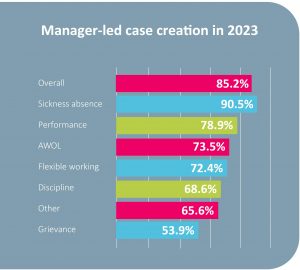Preparing for change: Why prioritising employee relations transformation is now so urgent
Now is the time to assess your employee relations strategy
With the local election results giving a strong indication of the likelihood of a Labour Government winning the next general election, significant reform to employee rights could be on the horizon. So, it is essential for organisations to prioritise employee relations transformation now in order to prepare for the potentially seismic impact of the reforms Labour are proposing.
However, recent research reveals critical gaps in current employee relations investment, draining resources and leaving useful data underutilised, hindering proactive strategies. This is concerning because traditional methods of capturing employee relations data, such as spreadsheets and basic case management ticketing systems, are inadequate when dealing with the complexity of employee relations data.
These tools lack the analytical power to provide actionable insights, so fall short in providing insight which helps HR identify and address the root cause of issues like high absenteeism or rising tribunal claims. Furthermore, they can’t offer the real-time data visibility needed to develop proactive strategies for tackling employee relations challenges.
Line managers, often lacking the necessary digital tools to enhance their confidence and capabilities, may intensify issues through mishandling employee-related matters and unnecessarily escalating them to HR, which can be prevented with the appropriate proactive measures.
The following guidance can help you reassess your current employee relations approach, highlighting areas for improvement and the positive impact those improvements can have on your organisation’s long-term success.
Manager-led employee relations case creation
E mpowering managers to take ownership of employee relations matters allows them to address issues promptly and effectively before they escalate. This frees up HR to focus on more complex matters and strategic initiatives.
mpowering managers to take ownership of employee relations matters allows them to address issues promptly and effectively before they escalate. This frees up HR to focus on more complex matters and strategic initiatives.
HR can then concentrate on critical organisational goals, such as preparing for the potential impact on employment law reform and prioritising people strategies and ED&I initiatives that can help improve employee experiences and retention. This reallocation allows HR to become a more strategic partner, proactively addressing potential workplace issues to create a positive work environment for everyone.
Question: Do you empower people managers by providing them with the tools to self-serve employee-related matters as they arise, without requiring HR intervention? For instance, are they equipped to address performance issues proactively before they reach a point where escalation becomes necessary, contributing to a positive employee experience?
See how ER case advisory costs were reduced by up to 65%
How fit-for-purpose HR case management tools improve manager capability
Research conducted among HR and the C-suite reveals a substantial deficiency in manager capabilities, acknowledged by almost 70% of respondents. Addressing the people management skills gap among managers is crucial for organisational success. This deficiency could encompass areas such as communication, decision-making, and conflict resolution, highlighting the pressing need for intervention.
To tackle this challenge, organisations can leverage the power of digital tools to streamline employee relations processes and increase efficiency. With the appropriate tools in place, organisations can effectively bridge any existing skill gaps among managers, empowering them to handle employee-related matters proficiently and with confidence.
- Empowering managers in people management involves providing digital guided journeys to help them to confidently and compliantly follow best practise. This boosts their confidence and accountability in handling employee relations matters.
- Taking a proactive approach to resolving issues and tracking progress ensures quick problem-solving, reduces disruptions, and improves productivity.
- Streamlined processes and automated alerts for delays also enables managers to address concerns proactively and confidently manage their teams.
W ith the help of simple, digitally guided journeys, empower® transforms the way managers self-serve employee relations matters 24/7, improving consistency at Sainsbury’s. Read the full case study here.
ith the help of simple, digitally guided journeys, empower® transforms the way managers self-serve employee relations matters 24/7, improving consistency at Sainsbury’s. Read the full case study here.
Question: Does your employee relations case management system provide managers with best practice guidance and escalate cases to relevant stakeholders if there are delays, facilitating a proactive approach to issue resolution?
See business transformation stats
Leverage real-time visibility of people insights to inform HR decision-making
A common challenge faced by organisations is the lack of real-time visibility of their teams’ caseloads, hindering workload management, performance monitoring, and service quality. Without access to user-friendly dashboards providing real-time updates on workloads, including high-risk and overdue tasks, important actions that need to be taken might be overlooked.
 Costs associated with absence and productivity losses, for example, can result from inadequate management, poor record-keeping, and insufficient HR systems. Fit-for-purpose HR software enables HR leaders to gain valuable insights into the organisation’s health, facilitating informed decision-making and proactive problem-solving. For instance, they can address areas of poor culture and mitigate the impact of sickness absence by proactively tackling root causes.
Costs associated with absence and productivity losses, for example, can result from inadequate management, poor record-keeping, and insufficient HR systems. Fit-for-purpose HR software enables HR leaders to gain valuable insights into the organisation’s health, facilitating informed decision-making and proactive problem-solving. For instance, they can address areas of poor culture and mitigate the impact of sickness absence by proactively tackling root causes.
Introducing technology that enables self-service case management capabilities for managers not only enhances the overall employee experience but also boosts satisfaction and retention rates. This technology streamlines the management of cases from initiation to resolution, ensuring consistency and efficiency.
Managers can log cases as they arise, capturing crucial information in the moment and facilitating swift resolution. This contributes to real-time visibility of people insights to inform HR decision-making
Question: Does your HR team have real-time visibility of their team’s case workload, including identification of high-risk issues and overdue tasks, through user-friendly dashboards? This enables organisations to stay agile, responsive, and proactive in navigating workforce challenges.
Tailor your HR case management solutions to your organisational needs
Customisation is key in effective employee relations management, recognising that one size does not fit all. Tailoring solutions to align with your organisation’s unique goals, objectives, and industry requirements is key. This adaptability enables seamless transitions and scalability, crucial for the evolution of UK enterprises.
For instance, at Curry’s, the shift towards manager-led employee relations tasks has soared to 88%. This transformation is empowered by 24/7 access, granting managers the flexibility to engage with the service at their convenience. A team of expert advisers stands ready to coach managers through intricate situations, ensuring adept handling.
This initiative has vastly improved the accuracy of recording employee relations cases. As a result, issues previously buried within fragmented data silos are promptly surfaced, facilitating proactive and swift responses. Read the full case study here to learn more.
Embracing tailored HR case management solutions not only leads to organisational agility but also enhances responsiveness and efficacy in addressing workplace challenges in real-time.
Question: Are your current processes tailored to align with your organisation’s specific goals and objectives, ensuring optimal functionality and efficiency to address workplace challenges?
Streamline HR case management with an intuitive user experience
Simplicity is crucial in human resources, where technology should empower rather than overwhelm. Achieving simplicity involves equipping managers with user-friendly tools and enabling HR to focus on their most important asset: their people.
 Forward-thinking organisations prioritise user-friendly technology to streamline HR processes and empower managers.
Forward-thinking organisations prioritise user-friendly technology to streamline HR processes and empower managers.
Through intuitive dashboards and advanced people analytics, fueled by data input from frontline managers, HR can swiftly make informed decisions regarding staffing, training, and compliance in real-time. This enhances their effectiveness and confidence in team oversight while upholding company policies.
Your HR case management technology should be intuitive, enabling users to navigate effortlessly and access insights quickly. This not only enhances manager capability but also ensures compliance with policy guidelines.
User-friendly technology goes beyond convenience, enabling HR leaders to analyse workforce data, identify trends, and drive employee development. This proactive approach drives continuous improvement, leading to organisational success and growth.
Question: Does your current technology simplify case management effectively for managers? Are your tools user-friendly, efficient, and empower HR to identify trends, ensuring compliance? Remember, investing in user-friendly tech empowers managers and HR to drive positive change and increase organisational performance.
Now is the time to embrace employee relations transformation
In anticipation of Labour’s proposed changes to employee rights, organisations must prioritise improving their approach to managing employee relations.
Proactively preparing for potential shifts is vital to minimise the impact of these reforms. Essential steps include:
- Evaluating your organisations HR technology stack
- Empowering your managers
- Investing in market leading HR software.
This proactive approach enables organisations to stay ahead of changes in employee rights and set themselves up for success in the face of potential reforms. Impressive results, like Wickes‘ 50% reduction in tribunal claims, emphasise the importance of streamlining employee relations case management processes. Read the full case study here.
Explore how the empower® employee relations case management system can support your organisation or schedule a personalised discovery call today.